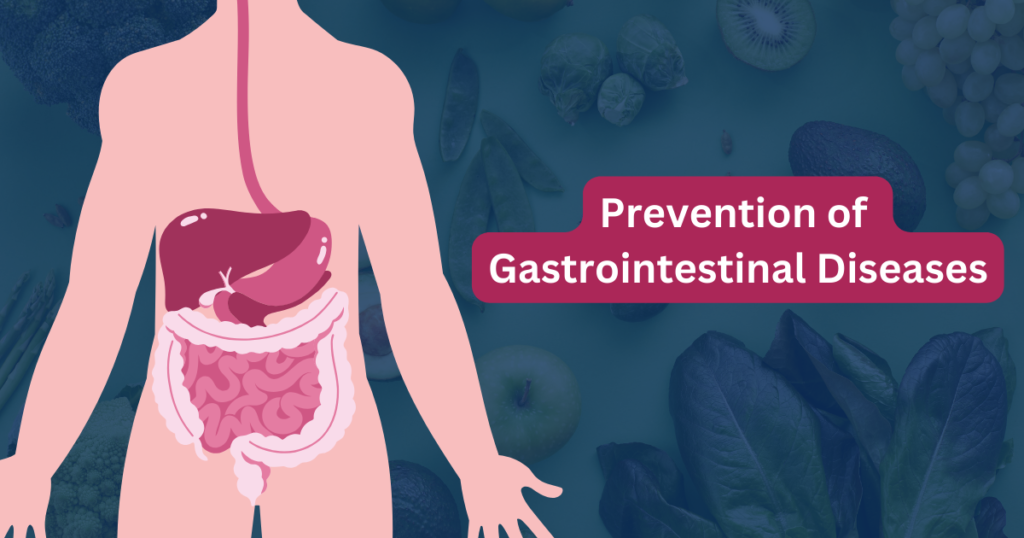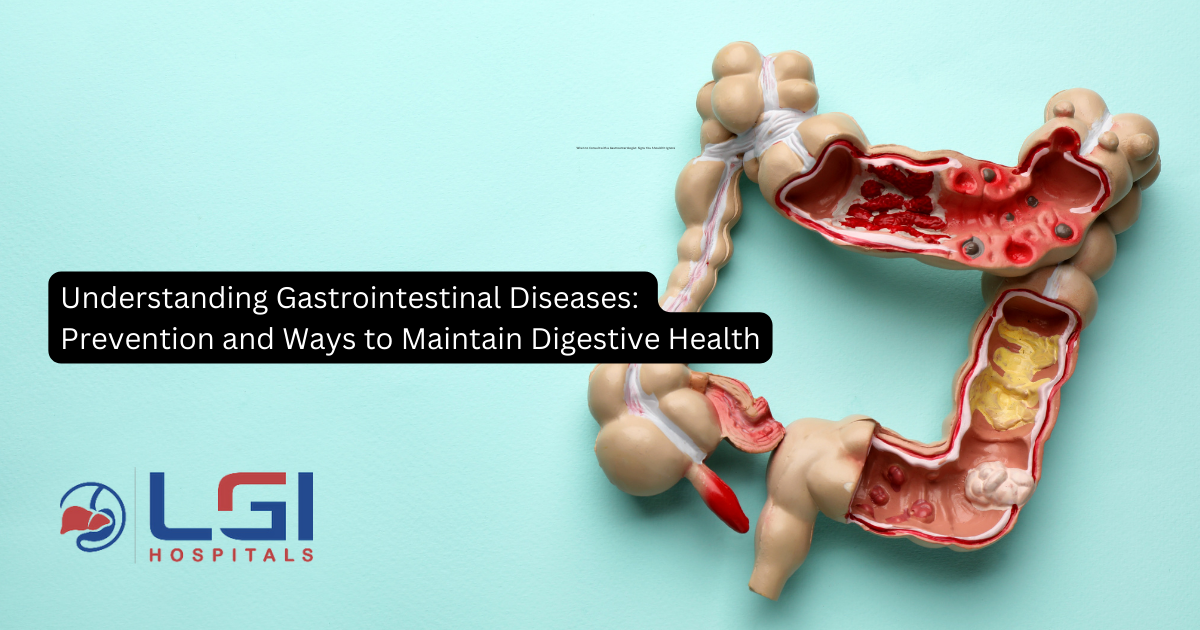The gastrointestinal (GI) system plays a vital role in the digestion and absorption of nutrients, as well as eliminating waste from the body. However, various diseases can affect the GI system, leading to discomfort, pain, and other complications. While some gastrointestinal disorders may be genetic or unavoidable, there are steps you can take to prevent and maintain a healthy digestive system.
This blog post will explore common gastrointestinal diseases, their prevention, and ways to support digestive health.
List Of Common Gastrointestinal Diseases
- Gastroesophageal Reflux Disease (GERD)
- Peptic Ulcer Disease (PUD)
- Inflammatory Bowel Disease (IBD)
- Irritable Bowel Syndrome (IBS)
- Gastroenteritis
- Gallstones
- Celiac Disease
- Diverticulitis
- Pancreatitis
- Colorectal Cancer
1. Gastroesophageal Reflux Disease (GERD)
- GERD is a chronic condition characterized by the backward flow of stomach acid into the esophagus.
- It causes symptoms such as heartburn, regurgitation, chest pain, and difficulty swallowing. GERD is usually caused by a weak lower esophageal sphincter (LES), which allows acid to flow back into the esophagus. In severe cases, lifestyle changes, medications, and surgery can help manage and treat GERD.
2. Peptic Ulcer Disease (PUD)
- Peptic ulcer disease refers to open sores that develop in the stomach lining, upper small intestine, or esophagus.
- The most common cause of PUD is a bacterial infection called Helicobacter pylori (H. pylori), which weakens the stomach’s protective lining. Other factors, such as long-term use of nonsteroidal anti-inflammatory drugs (NSAIDs) and excessive alcohol consumption, can also contribute to PUD.
- Treatment options for PUD include antibiotics to eradicate H. pylori, acid-suppressing medications, and lifestyle modifications.
3. Inflammatory Bowel Disease (IBD)
- Inflammatory bowel disease is a term used to describe chronic inflammation of the digestive tract. The two main types of IBD are Crohn’s disease and ulcerative colitis.
- Crohn’s disease can affect any part of the GI tract, from the mouth to the anus, and involves inflammation in the deeper layers of the bowel wall.
- Ulcerative colitis primarily affects the colon and rectum, causing inflammation and ulcers on the colon’s inner lining.
- Symptoms of IBD may include abdominal pain, diarrhea, rectal bleeding, weight loss, and fatigue.
- Treatment for IBD aims to reduce inflammation, control symptoms, and prevent complications. Medications, lifestyle changes, and, in severe cases, surgery may be necessary.
4. Irritable Bowel Syndrome (IBS)
- Irritable bowel syndrome is a common disorder characterized by recurring abdominal pain, bloating, and changes in bowel habits.
- The exact cause of IBS is unclear, but factors such as abnormal muscle contractions in the intestine, increased sensitivity to pain, and changes in gut bacteria may contribute to its development.
- Management of IBS often involves dietary modifications, stress management techniques, medications to alleviate symptoms, and lifestyle changes.
5. Gastroenteritis
- Gastroenteritis, commonly known as the stomach flu, is an inflammation of the stomach and intestines. It is usually caused by a viral or bacterial infection, contaminated food or water, or contact with an infected individual.
- Symptoms of gastroenteritis include diarrhea, vomiting, abdominal pain, nausea, and fever. Treatment involves rest, staying hydrated, and, in some cases, medications to control symptoms.
6. Gallstones
- Gallstones are hardened deposits in the gallbladder, a small organ beneath the liver.
They can cause symptoms such as severe abdominal pain (known as biliary colic), nausea, vomiting, and jaundice. Gallstones may form when the substances that makeup bile are imbalanced or when the gallbladder does not empty properly. Treatment options for gallstones may include:
- Medications to dissolve the stones.
- Surgical removal of the gallbladder (cholecystectomy).
- Other minimally invasive procedures.
7. Celiac Disease
- Celiac disease is an autoimmune disorder triggered by gluten consumption, a protein found in wheat, barley, and rye. In individuals with celiac disease, ingesting gluten leads to an immune reaction that damages the lining of the small intestine.
- Causing various symptoms such as diarrhea, abdominal pain, bloating, weight loss, and fatigue. The only effective treatment for celiac disease is a strict, lifelong gluten-free diet.
8. Diverticulitis
- Diverticulitis is the inflammation or infection of small pouches (diverticula) that form along the walls of the large intestine. These pouches can become inflamed or infected when fecal matter becomes trapped inside them.
- Symptoms of diverticulitis include abdominal pain, fever, nausea, and changes in bowel habits. Mild cases can be treated with rest, dietary modifications, and antibiotics, while severe cases may require hospitalization and surgery.
9. Pancreatitis
- Pancreatitis is inflammation of the pancreas, a gland that produces digestive enzymes and hormones.
- Symptoms may include severe abdominal pain (often in the upper abdomen), nausea, vomiting, fever, and rapid pulse.
- Treatment may involve hospitalization, intravenous fluids, pain medications, and addressing the underlying cause, such as gallstones or alcohol consumption.
10. Colorectal Cancer
- Colorectal cancer refers to cancer that develops in the colon or rectum.
- Symptoms may vary but can include changes in bowel habits, rectal bleeding, abdominal discomfort, unexplained weight loss, and fatigue.
- Early detection through screening tests, such as colonoscopy, is crucial for timely diagnosis and treatment. Treatment options may include surgery, radiation therapy, chemotherapy, or targeted drug therapy.

Prevention of Gastrointestinal Diseases
While it may not be possible to prevent all gastrointestinal diseases, there are several measures you can take to reduce your risk and maintain a healthy digestive system:
1. Adopt a Healthy Diet
- Eat a balanced diet rich in fruits, vegetables, whole grains, lean proteins, and healthy fats. Limit processed foods, sugary snacks, unhealthy fats, and excessive caffeine, as they can disrupt the gut microbiota and lead to digestive issues.
2. Drink Plenty of Water:
- Stay hydrated by drinking adequate water throughout the day. Water helps soften the stool and aids in digestion and nutrient absorption.
3. Manage Stress:
- Chronic stress can disrupt the normal functioning of the GI system. Practice stress management techniques such as meditation, deep breathing exercises, yoga, or engaging in hobbies to reduce stress levels.
4. Exercise Regularly:
- Regular physical activity stimulates intestinal contractions, promoting proper bowel function and preventing constipation. Aim for at least 30 minutes of moderate-intensity exercise most days of the week.
5. Limit Alcohol and Quit Smoking:
- Excessive alcohol consumption can irritate the stomach lining and disrupt the balance of gut bacteria. Limit your alcohol intake to moderate levels or avoid it altogether. Smoking weakens the lower esophageal sphincter and can lead to acid reflux and other digestive problems.
6. Practice Proper Food Safety:
- Follow safe food handling practices to prevent foodborne illnesses. Wash your hands thoroughly before preparing or eating food, cook food to the appropriate temperature, and store leftovers properly.
7. Maintain a Healthy Weight:
- Obesity is associated with an increased risk of gastrointestinal diseases. Maintain a healthy weight through a balanced diet and regular exercise.
8. Practice Portion Control:
- Overeating can strain the digestive system and lead to discomfort. Practice portion control by listening to your body’s hunger and fullness cues.
9. Get Regular Screenings:
Regular screenings can help detect early signs and improve treatment outcomes for certain gastrointestinal diseases, such as colorectal cancer. Consult your healthcare provider about the appropriate screening tests for your age and risk factors. Consultation is readily available at LGI Hospitals, Nagpur.
It is important to note that these preventive measures may not eliminate the risk of gastrointestinal diseases, as some conditions may have genetic or other underlying factors. If you experience persistent or severe symptoms, it is best to consult a healthcare professional for a proper diagnosis and treatment plan available at LGI Hospitals, Nagpur. In conclusion, gastrointestinal diseases can be prevented to some extent by adopting a healthy lifestyle, following good dietary practices, and managing stress. However, seeking medical advice for proper diagnosis and treatment is always essential.

